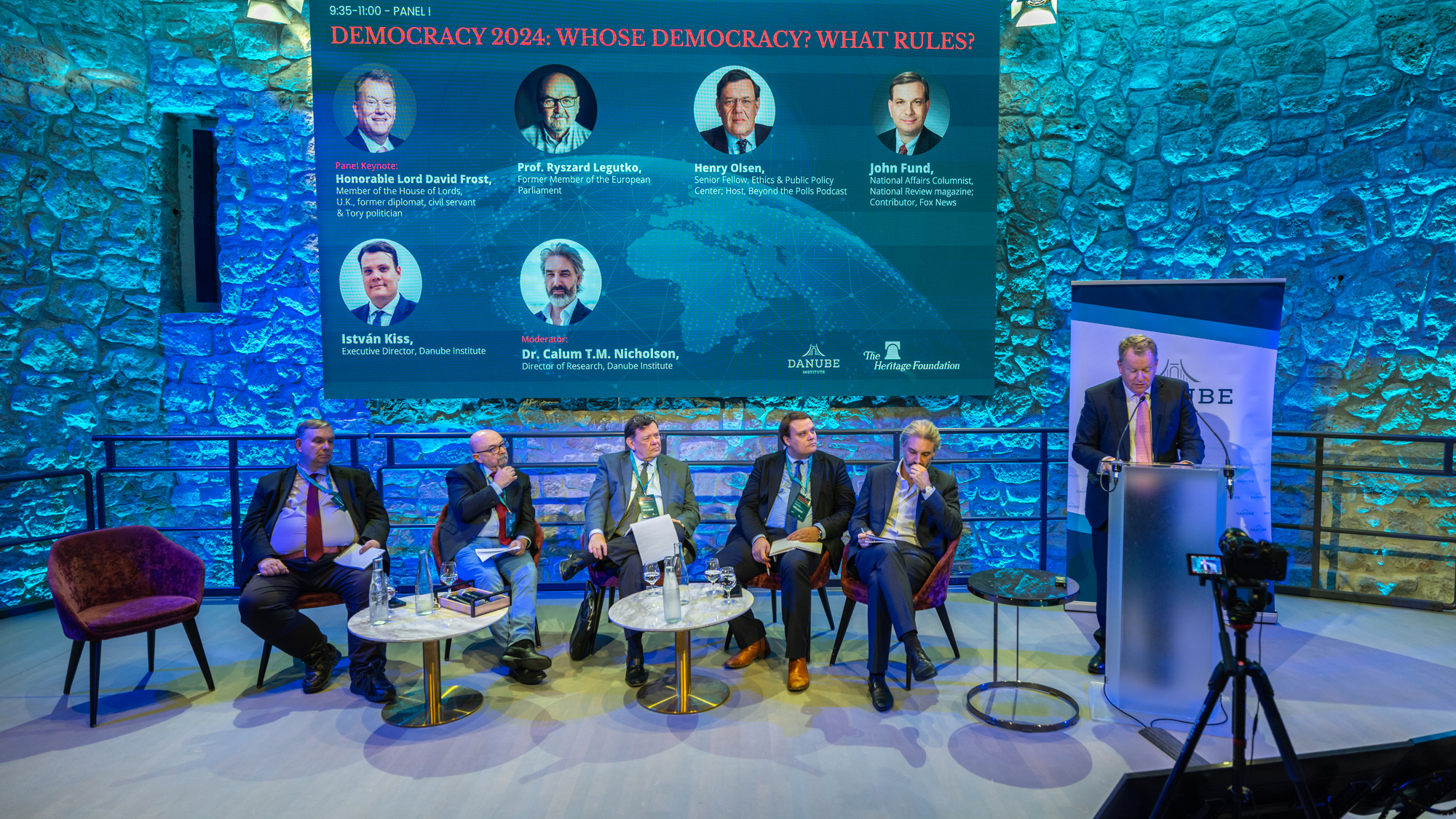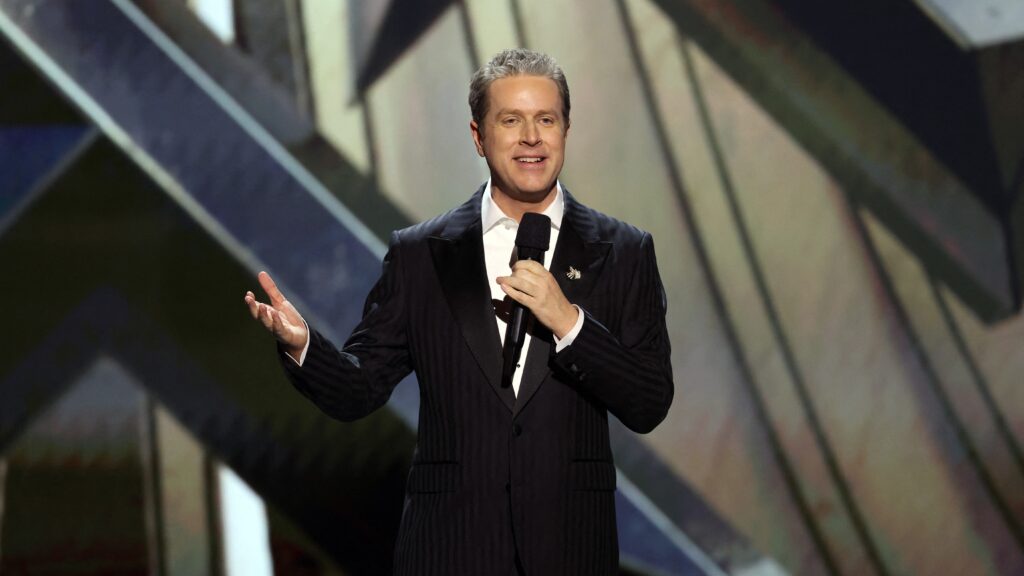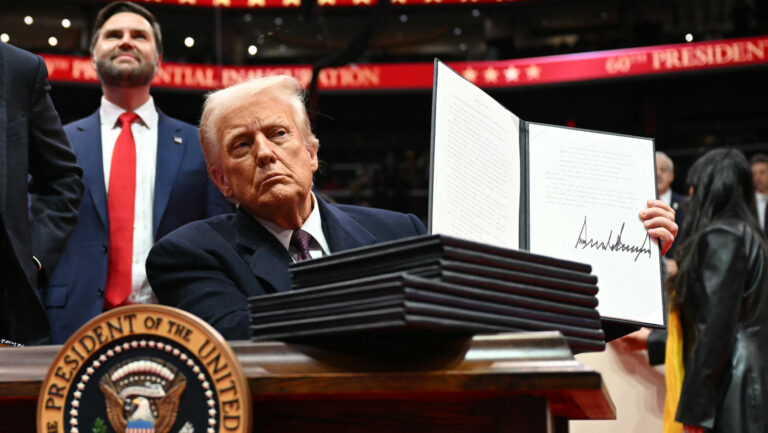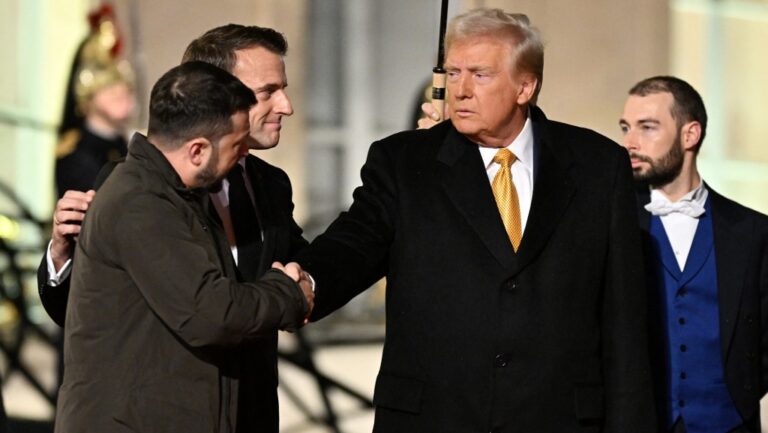The fourth Danube Institute – The Heritage Foundation Geopolitical Summit is taking place on 17–18 September at the Lónyay-Hatvany villa in the famous Castle District of Budapest, Hungary. The event is running under the tagline Whose New World Order?.
The first panel discussion of the event was titled Democracy 2024: Whose Democracy? What Rules?. The panel was moderated by Director of Research at the Danube Institute Dr Calum T M Nicholson. Speakers included the Honourable Lord David Frost, Member of the House of Lords, UK, former diplomat, civil servant and Tory politician; Former Member of the European Parliament Professor Ryszard Legutko; Henry Olsen, Senior Fellow at the Ethics and Public Policy Center and Host of the Beyond the Polls Podcast; John Fund, National Affairs Columnist at National Review magazine and Contributor at Fox News; and Executive Director of the Danube Institute István Kiss.
The keynote speech during the panel was delivered by Lord David Frost. He began by discussing whether Western democracy is in ‘reasonable health’. He believes it is, as it is working, it is meaningful, and it is not being controlled. He added that considering the pressure that Western democracy is under, it works reasonably well. He also opined that as long as people can think freely and there are debates on important matters, democracy is well and alive.
However, in his opinion there are two main areas of concern in regards to democracy. One of them is the constraint on free speech, which is a result of political collectivism. He believes that this is a direct consequence of mass immigration and the public ideology of diversity. Many have forgotten that society did not use to be like this. He added that these constraints have increased recently; and they will, in the long run, result in us not being able to test ideas in democratic discussions as we have done in the past.
The other concern is that political elections cannot induce real change. The EU has created a semi-permanent governing class, meaning that even if a member state manages to change their governing bodies through elections, they are bound to butt heads with Brussels on important issues, as many of the legislations are deeply set in the European Parliament, and individual states are not able to contradict them.
‘The other concern is that political elections cannot induce real change’
He then talked about whether there is a resurgence of Conservatism. He opined that while it is on the rise, many parties are only Conservative in name. He said that failure to keep believing in conservative values is the reason why growth on the west is weakening. Thus, restoring the nation state is a priority. A sovereign nation can change its policies. Without it, you can debate but you cannot change. There is still a long way to go before we get back to Conservatism like it was in the 1980s and 1990s. Our current opponents are formidable ones, he emphasized.
‘The urgent task before Western democracy is to recover our strength, bring our ambitions in line with our actual power, and avoid needles confrontation if possible. We may or may not succeed, but it is our job as conservatives to make the effort,’ he concluded.
Professor Legutko followed on stage. He emphasized that the EU is still strong and it will remain so for a while. He added that the most striking fact is that the moral content has been absent in the liberal agenda—the moral issues the left has made are one of the most destructive bulldozers of the fabric of modern society. He also added that most Conservative parties are not conservative in reality. He opined that there are three ways to approach the Conservative problem: accommodation, opposition, and playing games. Accommodation results in conservative parties losing their values, opposition is futile, so in his opinion, the only option is playing games. He believes that in the next five years, there will not be impactful change in European politics.
Henry Olsen highlighted the economic aspect of democracy. He opined that economic liberalism in Hungary is a great model, as the government has managed to express the Hungarianness of its people. Social values shared by Hungarian people have become part of a privately led economy. Growth is equally shared and values are not affected or undermined by growth, whis is difficult to achieve. Conservative parties have a decision to make—move with their voters to the social left or attract new voters. Many parties choose the former, he added. Nationalism, markets and redistribution are the secret to the way forward, he concluded.
John Fund started by remarking on the approaching US presidential election. He emphasized that in the last two months, Kamala Harris went to one on one interviews with journalists twice altogether, while Donald Trump had two assassination attempts, which are not great prospects to either party. He added that there has been an ongoing cover-up in the White House regarding Biden’s health, while Harris had no policies on her site. A day before the debate she finally did, and some of them were word-for-word plagiarized from Biden’s policies. He added that while Hungary, especially Viktor Orbán took a firm stand behind supporting Trump, the country has to be aware of the possibility that he may not win the election. In Fund’s opinion, if Harris gets elected, Hungary needs to focus on their friends in the US, because the Brussels narrative has reached the country. In his opinion, if Harris is the next president, ‘a storm is coming’ for Hungary.
‘Hungary has to be aware of the possibility that Trump may not win the election’
István Kiss said that in his opinion the electorate has indeed shifted to the right. He added that people need to ‘be more brave in being conservative’. He noted that in the EU elections, if one adds up the numbers, it is clear that right-wing parties have reached a majority. However, the issue is that centre-right parties are looking to enter coalitions with green or more liberal parties instead of aiming toward the populist right. These parties have to realize who their electoral bases are and need to make coalitions with parties that align with them. People are more on the conservative side than the mainstream media would have us believe, he concluded.
Read more on the conference:







